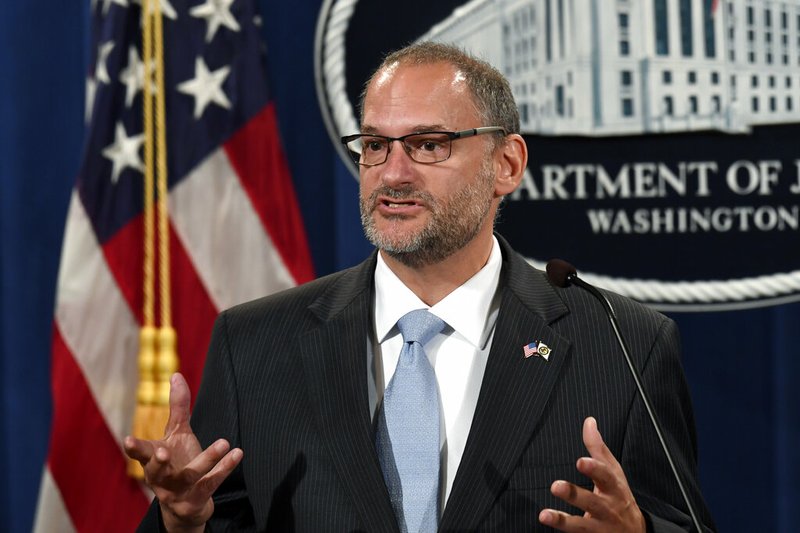WASHINGTON -- Attorney General William Barr announced Monday that he is replacing the head of the Bureau of Prisons, marking the latest fallout from the death in federal custody of multimillionaire sex offender Jeffrey Epstein.
Hugh Hurwitz, the agency's acting head, will be replaced by Kathleen Hawk Sawyer, who served as Bureau of Prisons director from 1992 to 2003. Barr also appointed Thomas Kane to serve as her deputy, a position currently vacant.
The announcement came hours after the New York Post published details of a will that Epstein wrote just two days before his Aug. 10 death and filed in the U.S. Virgin Islands, where he has a home. The will transferred all of Epstein's assets, estimated at about $578 million, into a trust, and it gives the trust's two executors power to "litigate, defend, compromise, settle, abandon or submit to arbitration" any claims against his estate, according to the document.
Epstein's estate is expected to face many lawsuits by women who claim he abused them when they were children.
The Bureau of Prisons, a $7 billion agency, had operated for years in relative obscurity before Epstein's death at Manhattan's Metropolitan Correctional Center. The apparent management flaws found since his death have angered the leaders of the U.S. Department of Justice, including the attorney general, according to law enforcement officials.
"I am pleased to welcome back Dr. Hawk Sawyer as the Director of the Federal Bureau of Prisons," Barr said in a statement. "Under Dr. Hawk Sawyer's previous tenure at the Bureau, she led the agency with excellence, innovation, and efficiency, receiving numerous awards for her outstanding leadership."
Barr said Hurwitz would return to his previous role as an assistant director for the bureau's re-entry programs. The attorney general did not mention the Epstein case in his announcement.
Robert Hood, a retired former warden at the supermax federal prison in Florence, Colo., called Hawk Sawyer an "outstanding" choice.
"After a lot of recent instability, Kathleen Hawk Sawyer brings stability and direction," said Hood, who has been critical of the Bureau of Prisons' recent leadership. "She's been a warden, she's been a trainer, and she means business. It's breathtaking to hear that she's back. It's exciting for the staff, many of whom have only heard about her. They know she's a nuts-and-bolts person and a very direct person to work with."
Hood predicted that Hawk Sawyer, a psychologist, will move quickly to fix a major problem at the bureau -- the number of senior positions that have gone unfilled or had their responsibilities delegated temporarily.
Critics of the Bureau of Prisons have said that Epstein's death, along with other security failures, should spur overdue changes inside the federal prison system. For example, no one has been charged in last year's killing of Boston gangster James "Whitey" Bulger at a West Virginia prison.
The bureau also was hit with a hiring freeze -- since lifted -- at the beginning of President Donald Trump's administration, and union officials say the Metropolitan Correctional Center and many other facilities do not have enough employees to operate effectively.
Epstein, 66, was found in his cell as Metropolitan Correctional Center staffers made their morning rounds. An official said Epstein hanged himself with a bedsheet attached to the top of a bunk bed. He was taken to a nearby hospital, where he was pronounced dead.
The report on Epstein's new will did not make clear who are the beneficiaries of his $578 million trust. The document specifies that Darren Indyke and Richard Kahn be appointed as executors, and that they will each be paid $250,000 for their service.
Indyke had served as an attorney for Epstein when he was indicted on charges of conspiracy and trafficking, accused of sexually abusing dozens of girls. Epstein pleaded guilty more than a decade ago to state prostitution charges in Florida, admitting to soliciting an underage girl.
Kahn served as president of Gratitude America Ltd., Epstein's tax-exempt foundation that began in 2012. The organization was widely seen as an attempt to rebuild Epstein's reputation after his guilty plea, casting him as a philanthropist for scientific and humanitarian causes. The organization donated to cancer charities, a youth tennis program and an all-girls school in Manhattan, among other beneficiaries.
Epstein's combined fortune is made up of real estate, cash, equities and other assets, according to the document. The $578 million valuation does not include Epstein's art collection, which is subject to appraisal, according to the document.
Prosecutors in Manhattan filed court papers Monday to close the case against Epstein, while saying they'll continue to investigate others involved in his case.
Information for this article was contributed by Devlin Barrett of The Washington Post; and by David Voreacos, Neil Weinberg, Sophie Alexander, Jonathan Levin and Anders Melin of Bloomberg News.
A Section on 08/20/2019
